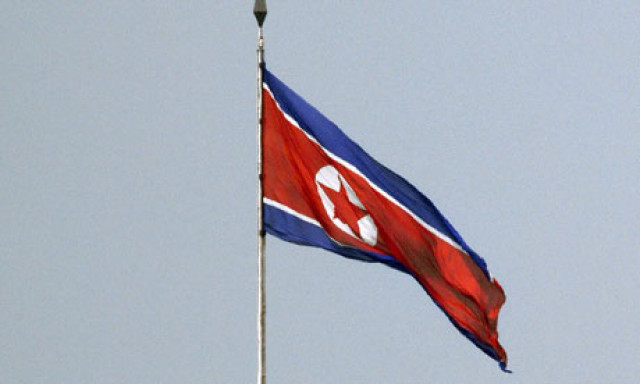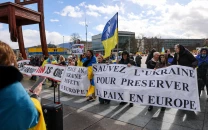N Korea gives evacuation warning to foreign missions
Similar letters have been sent to several European embassies, including Britain and Russia.

The North Korean flag. PHOTO: AFP/ FILE
An embassy spokesperson told Russian news agencies that the North Korean foreign ministry had suggested they "examine the question of evacuating employees" from the mission.
It told the British mission that it cannot protect foreign embassies after April 10 in the event of a conflict.
The spokesperson said he believed a similar suggestion had been made to other diplomatic missions in the capital.
A spokesperson said Pyongyang had advised London that "from April 10, the North Korean government would be unable to guarantee the safety of embassies and international organisations in the country in the event of conflict".
"The DPRK has responsibilities under the Vienna Convention to protect diplomatic missions and we believe they have taken this step as part of their country's rhetoric that the US poses a threat to them," the Foreign Office spokeswoman said.
North Korea, incensed by UN sanctions and South Korea-US military drills, has issued a series of apocalyptic threats of nuclear war in recent weeks, and international concern that the situation might spiral out of control is clearly growing.
UN chief Ban Ki-moon described the daily threats from Pyongyang as "really alarming and troubling" and Germany summoned the North Korean ambassador to convey Berlin's "serious concern".
Philippine Foreign Secretary Albert del Rosario said he was flying to Seoul on Saturday and would "fully vet" contingency plans for ensuring the safety of 43,000 Filipino workers in South Korea.
The spike in tensions case as Yonhap news agency, citing a top South Korean government official, said North Korea had loaded two mid-range missiles on mobile launchers and hidden them in underground facilities near its east coast.
"The North is apparently intent on firing the missiles without prior warning," the official said.
The South's Defence Ministry, which on Thursday had confirmed the movement of one missile with "considerable range", declined to comment on the new report.
But a Navy official told Yonhap that two South Korean Aegis destroyers with advance radar systems had been deployed – one off the east coast and one off the west coast – to track any missile launch.
"If the North fires off a missile, we will trace its trajectory," the official said.
The Musudan has never been tested, but is believed to have a range of around 3,000 kilometres (1,860 miles), which could theoretically be pushed to 4,000 with a light payload.
That would cover any target in South Korea and Japan, and possibly even reach US military bases located on the Pacific island of Guam.
White House spokesman Jay Carney said Thursday that the barrage of rhetoric flying out of Pyongyang fitted a "regrettable but familiar" pattern of North Korean behaviour.
"We're taking all the necessary precautions," Carney said, citing "prudent measures" to respond to the possible missile threat.
The Pentagon has said it will send missile-interceptor batteries to protect its bases on Guam, a US territory some 3,380 kilometres (2,100 miles) southeast of North Korea and home to 6,000 American military personnel.
Most experts think the North is not yet capable of mounting a nuclear device on a ballistic missile which could strike US bases or territory.
On Thursday the North Korean army said it had received final approval for military action, possibly involving nuclear weapons, against the threat posed by US B-52 and B-2 stealth bombers participating in joint military drills with South Korea.
There has been speculation that Pyongyang might schedule a missile launch to coincide with the birthday of the North's late founder Kim Il-Sung in mid-April.
"A flight test would make sense," Daniel Pinkston, a North Korea expert at the International Crisis Group, told AFP.
"But I'd be surprised if they used an untested missile. At this stage in the game, they don't want to be firing off something that might disintegrate after 30 seconds."
Tensions have soared on the Korean peninsula since December, when the North test-launched a long-range rocket. In February, it conducted its third nuclear test and drew fresh UN sanctions.
The North also warned this week it would reopen its mothballed Yongbyon reactor – its source of weapons-grade plutonium that was closed in 2007 under an aid-for-disarmament accord.
On Thursday, North Korea blocked access to its Kaesong joint industrial zone with South Korea for the second day running, and threatened to pull out its 53,000 workers in a furious reaction to the South's airing of a "military" contingency plan to protect its own workers there.
The Unification Ministry said there were still 608 South Korean citizens in Kaesong, which was shut Friday for a scheduled North Korean holiday.



















COMMENTS
Comments are moderated and generally will be posted if they are on-topic and not abusive.
For more information, please see our Comments FAQ